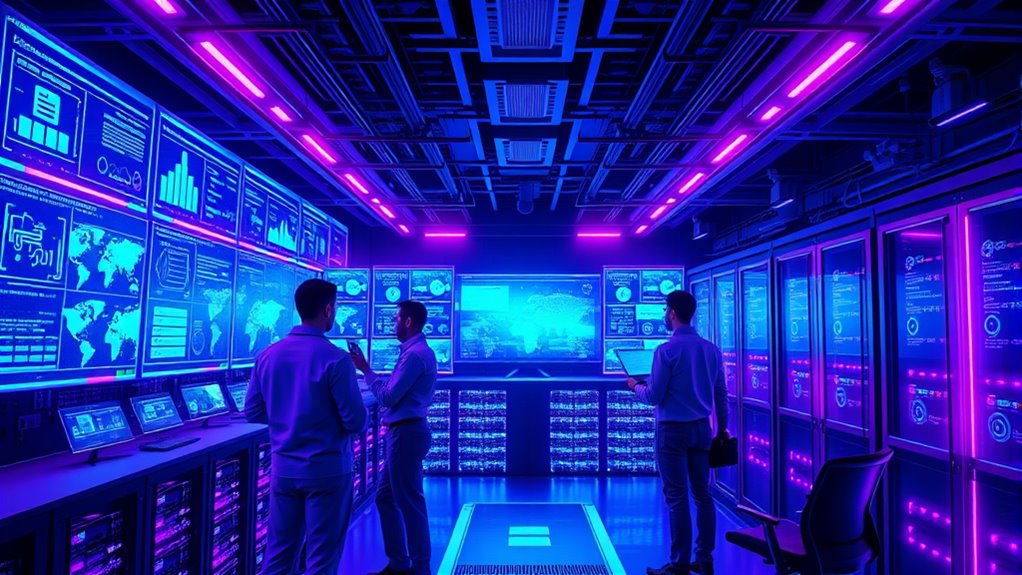By 2025, you’ll see DevOps becoming more scalable and intelligent through the rise of platform engineering and AIOps. These innovations will streamline workflows, automate complex decision-making, and embed security into every stage of development. Standardized, self-service platforms will empower your teams to innovate faster. As automation and AI evolve, your organization will become more resilient and secure. Keep exploring to discover how these shifts will reshape your DevOps strategies and boost your competitive edge.
Key Takeaways
- Platform engineering will standardize self-service environments, boosting development speed and operational consistency by 2025.
- AIOps will enable predictive analytics and automated incident management, reducing downtime and enhancing system reliability.
- Integration of automation frameworks with security (DevSecOps) will become more seamless, ensuring secure, rapid delivery cycles.
- AI and ML will automate complex decision-making, optimizing resource use and proactively resolving issues before impact.
- DevOps practices will evolve into highly scalable, resilient ecosystems, accelerating innovation and digital transformation initiatives.

As organizations accelerate their digital transformation, DevOps is evolving faster than ever, shaping how teams deliver software and respond to changing market demands. One major driver of this evolution is the increasing reliance on automation frameworks, which streamline repetitive tasks and enable faster, more reliable deployments. By leveraging these frameworks, you can automate everything from code testing to infrastructure provisioning, reducing manual errors and freeing up your team to focus on strategic initiatives. Automation frameworks also facilitate continuous integration and continuous delivery (CI/CD), ensuring that updates roll out smoothly and swiftly. But automation isn’t limited to just deployment pipelines; security integrations are becoming a critical component of DevOps practices. Integrating security into your automation workflows—often called DevSecOps—ensures vulnerabilities are identified and addressed early in the development process, rather than after deployment. This shift helps you maintain a secure software supply chain without slowing down delivery cycles. As security tools become more integrated into your automation frameworks, you gain real-time visibility into potential threats, allowing you to respond proactively rather than reactively. This seamless integration helps bridge the gap between development, operations, and security teams, fostering a culture of shared responsibility. Alongside automation and security, there’s a growing emphasis on platform engineering, which aims to create standardized, self-service platforms that empower teams to deliver software more efficiently. Instead of building custom environments from scratch, you can leverage these platforms to access pre-configured tools, environments, and processes—accelerating development cycles and reducing setup time. Platform engineering also promotes consistency across teams, ensuring everyone operates within the same set of standards and best practices. This consistency simplifies troubleshooting, enhances security, and improves overall quality. As these trends converge, the role of AI and machine learning in DevOps is also expanding. They enhance automation frameworks by predicting failures, optimizing resource utilization, and automating complex decision-making tasks. This evolution allows your teams to be more proactive, addressing issues before they impact users. Additionally, understanding the importance of color accuracy and contrast ratios in home cinema projectors can lead to a more immersive viewing experience, just as integrating security and standardization improves software quality. Overall, the future of DevOps in 2025 revolves around integrating automation frameworks deeply into workflows, embedding security at every stage, and building scalable platforms that serve as the backbone for rapid innovation. These elements work together to create a more resilient, secure, and agile environment—one that adapts quickly to market shifts and technological advancements. By embracing these developments, you position your organization at the forefront of digital transformation, ready to meet the challenges of tomorrow with confidence and efficiency.
Frequently Asked Questions
How Will AI Impact Devops Team Structures by 2025?
By 2025, AI will reshape your DevOps team structures through AI-driven workflows that automate repetitive tasks, freeing your team to focus on strategic initiatives. You’ll see increased cross-platform integration, enabling seamless collaboration across tools and environments. This shift will foster more agile, efficient teams, where AI augments your skills and accelerates deployment cycles, ultimately creating a more responsive and innovative DevOps culture.
What Are the Biggest Risks of Automating Platform Engineering?
Automation pitfalls and cultural challenges are the biggest risks when automating platform engineering. You might face resistance from team members reluctant to change, and automation errors could lead to system instability. If you overlook proper training and fail to foster a collaborative culture, you risk creating silos or losing valuable human oversight. To succeed, address these risks early, communicate clearly, and guarantee your team feels involved and prepared for the automation transition.
How Will Devops Tools Integrate With Emerging Cloud Technologies?
Like explorers steering uncharted waters, you’ll find DevOps tools seamlessly integrating with emerging cloud technologies through advanced container orchestration and multi-cloud strategies. These tools will adapt to the evolving cloud landscape, enabling smooth deployment, scaling, and management across diverse platforms. Expect automation to become more intelligent, simplifying complex workflows and empowering you to innovate faster while maintaining control over your multi-cloud environment.
What Skills Will Be Most Valuable for Devops Professionals in 2025?
In 2025, you’ll find skills development essential for career growth. Focus on mastering automation, cloud-native technologies, and AIOps to stay ahead. Strong expertise in platform engineering and understanding emerging cloud architectures will set you apart. By continuously upgrading your skills, you can adapt to rapid technological changes and seize new opportunities, ensuring your career remains dynamic and competitive in the evolving DevOps landscape.
How Can Organizations Ensure Security With Increased AI and Automation?
You can guarantee security with increased AI and automation by implementing strong AI governance frameworks and integrating security automation into your workflows. By regularly monitoring AI systems and automating threat detection, you reduce vulnerabilities and respond faster to incidents. Establish clear policies for AI use, train your team on security best practices, and leverage automation tools to continuously enforce security standards, keeping your organization resilient against evolving cyber threats.
Conclusion
As you look ahead to 2025, the rise of platform engineering and AIOps promises to transform your DevOps practices. Will you embrace these innovations to streamline your workflows and boost efficiency? Staying ahead means adapting quickly and leveraging these cutting-edge tools. The future of DevOps is exciting—are you ready to lead the way and make the most of what’s coming? Your next big breakthrough could be just an upgrade away.









